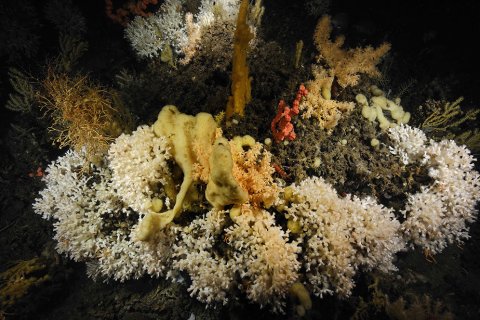Oceans offering solutions to combat climate change
The world’s oceans offer unexplored solutions to counter the adverse effects of climate change like ocean warming, ocean acidification and sea level rise. An international team of world leading experts in marine science, geoengineering and climate change, including Earth scientist Jack Middelburg at Utrecht University, evaluated the potential of thirteen different ocean-based measures to lessen the impact of climate change, such as the development of renewable marine energy sources, creating marine protected areas or relocating coral reefs. Their findings are published in Frontiers in Marine Science.

Global efforts to combat climate change and its impacts have so far largely focused on land-based actions while relatively little attention has been paid to the potential of ocean-based solutions, the researchers write. These solutions could reduce the magnitude and rate of ocean warming, ocean acidification, sea-level rise, while they could also play a significant role in helping to reduce global warming and its impacts on the rest of the planet.
“The world’s oceans already regulate the effects of global warming by removing about a quarter of anthropogenic CO2 emissions. The ocean has the potential to remove and store much more,” says Jack Middelburg, professor of Geochemistry at Utrecht University and the Netherlands Earth System Science Centre. “Collectively, we’ve assessed the effectiveness of thirteen potential ocean-based solutions to reduce the causes of climate change, and to lessen adverse impacts on vulnerable marine ecosystems, like coral reefs.”
Assessed solutions
The different measures that were analysed were selected on the basis of the frequency with which they are addressed in the scientific literature and were grouped in four different categories:
- reducing causes of climate change, for example by developing renewable marine energy sources or restoring marine plant life to capture more carbon;
- preserving ecosystems by creating marine protected areas and prohibiting overexploitation of resources;
- reducing the effects of solar radiation by changing the ocean reflectivity;
- manipulating biological and ecological adaptation, for example by relocating coral reefs.

The solutions were compared to each other in terms of respective risks and benefits. “Marine renewable energy and solutions based on carbon storage by plants offer numerous benefits and are easy to implement. In contrast, measures based on the control of solar radiation, which is global, are controversial in the scientific community because of numerous technological unknowns and the risks. Evaluating such actions enables us to inform policymakers on the risks associated with them,” explains lead author dr. Jean-Pierre Gattuso, research director at the Centre National de la Recherche Scientifique (CNRS).
COP24
The researchers find that the various solutions described are not equally realistic, effective, or even appropriate, but do constitute concrete actions that merit study by government and society in unison. The scientists hope their analysis will inform decision-makers gathering in Katowice, Poland, for the COP24 conference in early December.
Article
Ocean solutions to address climate change and its effects on marine ecosystems
Gattuso, J.-P., Magnan, A.K., Bopp, L., Cheung, W.W.L., Duarte, C.M., Hinkel, J., McLeod, E., Micheli, F., Oschlies, A., Williamson, P., Billé, R., Chalastani, V., Gates, R.D., Irisson, J.-O., Middelburg, J.J., Pörtner, H.-O., Rau, G.H.
Frontiers in Marine Science, 2018

